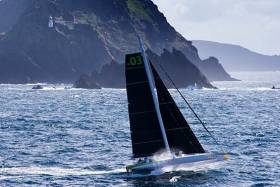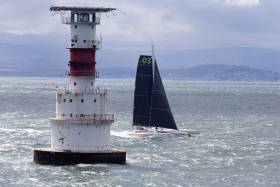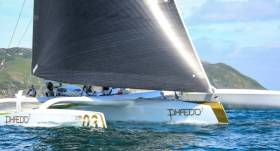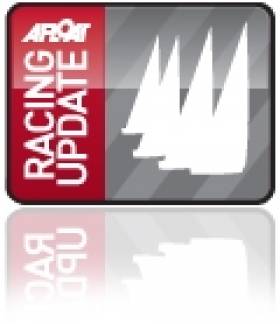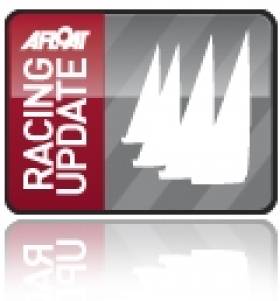Displaying items by tag: Phaedo
Race to The East Coast for Phaedo 3 Before Wind Dies (VIDEO)
Having left Dublin Bay (Kish lighthouse) at approximately 3pm yesterday (Wednesday), American trimaran Phaedo3 is now two–thirds of the way round their anti–clockwise Round Ireland record bid. TRACKER here.
The crew, led by skipper Lloyd Thornburg, are currently gybing downwind towards the Fastnet rock and the sun is shining on the 70–ft trimaran. The time to beat is Oman Sail's June record of 38 hours, 37 minutes and 7 seconds.
While progess to date has been good thus far, things look a bit soft for the international crew this evening on the east coast between the Kish light finish and the Tuskar Rock, but they’ve quite a good margin in hand.
It's important now that they get to the East coast before the wind dies.
Phaedo 3 Trimaran Blast Off on Round Ireland Record Attempt
Phaedo3 has just blasted through the start line of the official WSSRC course for the 'Round Ireland' record, in attempt to set a new time. With winds of over 20 knots, gusting 30 they speed through the line right beside Kish lighthouse on Dublin Bay in an anti–clockwise direction with the hope of breaking the existing record.
Lloyd Thornburg and his team tried to keep this record attempt under wraps, but now the secret is well and truly out. The boat and crew are fresh from winning the Round Island Race in the UK, in which saw the boat smashing Sir Ben Ainslie’s record, and setting a new record of just 2 hours 23 minutes and 23 seconds, for speed sailing round the Isle of Wight.
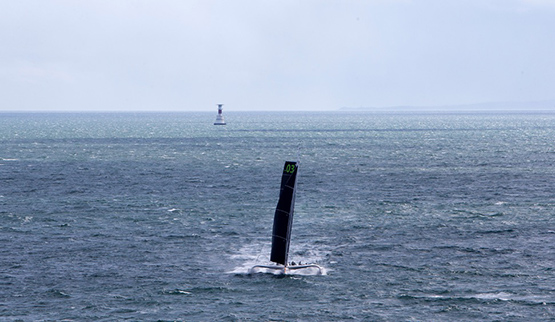 Phaedo 3 on her way northabout on a Round Ireland Record mission. Photo: Rachel Fallon–Langdon
Phaedo 3 on her way northabout on a Round Ireland Record mission. Photo: Rachel Fallon–Langdon
The team were last in Ireland for the Volvo Round Ireland Race, where after leading for the last leg, got pipped at the post by a few minutes by their fellow MOD70 Oman. The current WSSRC record is held by the MOD70 Oman when they crossed the Volvo Round Ireland Race finish line at Wicklow in just 38 hours, 37 minutes and 7 seconds.
Phaedo3 say they hope to knock a couple of hours off this record.
Crew on board for the race: Lloyd Thornburg - helm, Brian Thompson - Co-Skipper, Miles Seddon - Navigator, Damian Foxall - Bow, Paul Allen - Trim, Sam Goodchild - Trim, Henry Bomby - Grinder, Fletcher Kennedy - Grinder
Phaedo3 tracker is here
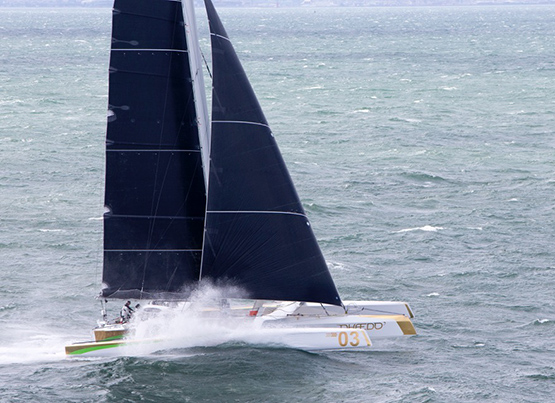 Phaedo3 has just blasted through the Dublin Bay start line Photo: Rachel Fallon-Langdon
Phaedo3 has just blasted through the Dublin Bay start line Photo: Rachel Fallon-Langdon
Round Ireland Speed Record Tracker CLICK HERE!
Track the Round Ireland speed record attempt by the MOD70 Phaedo3 Lloyd Thornburg below.
The record time to beat is: 38 hours, 37 minutes and 7 seconds.
Stay tuned to the Yellowbrick tracker below.
Irish Cat Sailors Prepare for Carribbean Race
Two Irish sailors, Ian Moore from Carrickfergus and Jeff Condell from Limerick, are on board the giant catamaran Team Phaedo this morning for the West Indies race.
Team Phaedo is a 66–foot Gunboat design from the drawing board of Nigel Irens. Yesterday the crew were out in the deep blue waters of St Barth exercising in a practice race, working out maneuvers for today's Les Voiles de Saint Barth.
Held on the fashionable French island in the northeastern Caribbean, today's regatta continues to show signs of healthy growth for its third edition, showcasing top sailing talent as well as some of sailing's most phenomenal racing machines competing around the French West Indies.
Navigator on Ireland's Green Dragon in the 2008 VOR, Ian Moore is the 41-year-old expert, who is now based in Cowes when he isn’t calling the tactical shots on some of the world's leading sailing machines is a regular on Afloat's pages, after he won the Volvo Ocean Race in 2001-2002 as navigator on Illbruck.
Jeff Condell has been racing on Phaedo over the past year. He was previously Shore Operations Manager for Ger O'Rourke's Delta Lloyd VOR campaign.
The video is the work of Richard Langdon, the well known British sailing stills photographer who brough us the front cover image of Annalise Murphy for Afloat's Spring issue, Richard's handling moving pictures pretty well too these days!
Transatlantic Race 2011 and Small Cat v Mega Yacht (Video!)
Like any good sailing match race, the second class to depart in the Transatlantic Race 2011 today was a duel of two radicals – this time between a 66ft carbon cat, and a 289ft 3 masted mega yacht. Today size didn't matter and the nimble cat, the Gunboat 66 Phaedo, quickly shot away leaving the Perini Navi, Maltese Falcon, flapping in her tracks.


























